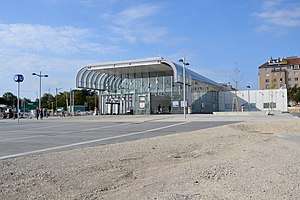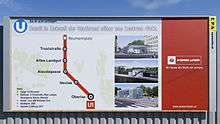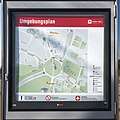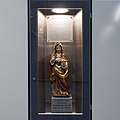Altes Landgut (Vienna U-Bahn)
Altes Landgut is a station on Line U1 located in Vienna's 10th district, Favoriten. The opening took place on September 2, 2017. It is part of the extension of the U1 from Reumannplatz to Oberlaa.
Altes Landgut | |||||||||||
|---|---|---|---|---|---|---|---|---|---|---|---|
 | |||||||||||
| Location | Favoriten, Vienna Austria | ||||||||||
| Line(s) | |||||||||||
| History | |||||||||||
| Opened | 2 September 2017 | ||||||||||
| Services | |||||||||||
| |||||||||||

Station conditions
The station Altes Landgut was built about 1.6 km south of the Reumannplatz in a low-lying area under the square called Altes Landgut, known in traffic announcements as Verteilerkreis Favoriten, and under the Favoritenstraße. The name comes from a restaurant on the northern slope of Laaer Berg that was demolished in 1900. Today's square is located on the top of the mountain, so it is, as far as sea level is concerned, the highest station on the U1 or the entire Vienna U-Bahn network.
The station serves theUniversity of Applied Sciences Vienna Campus, in German FH Campus Wien, the football stadium Generali Arena, and the summer spa Laaerbergbad, all three of which are in the immediate vicinity. Furthermore, you can change here (as before from the tram line 67) to the bus line 15A, which crosses the route of the U1 and connects Meidling (U4, U6) tangentially with Simmering (U3). The extent to which the station will be used for "Park & Ride" by motorists of the Südosttangente (A23) in the Laaerbergtunnel between the Altes Landgut and the subway line depends on the expansion of the parking lots near the station.
For this purpose, and for the planned construction of a new neighborhood around the subway station or the traffic circle, a press release by the Planning Department of the Vienna City Administration was published in the spring of 2014.[1] At the end of 2015, project partner Asfinag announced that the construction of the new neighborhood would be postponed for several years for economic reasons.[2]
Design
On the distribution floor of the station, the walls of the escalator were provided with the large-format mural "face-tracking snails" (Gesichtsüberwachungsschnecken) by the Swiss computer artist Yves Netzhammer. The total of 63 stylized portraits are a playful tribute to the diversity of people and the ubiquitous monitoring by face recognition. They are humorous depictions with many loving details. The drawings were applied to the metal plates by means of digital direct printing (DDP) and a special paint that uses light interference effects. This flip-flop lacquer causes the color to be perceived differently from different angles; the drawings therefore seem to change as you pass by on the escalator.
Also in the distribution floor is a small figure of Saint Barbara, the patron saint of miners.
Gallery
 South entrance
South entrance South entrance, interior
South entrance, interior North entrance
North entrance Distribution floor
Distribution floor Platform for trains to Leopoldau
Platform for trains to Leopoldau Platform for trains to Oberlaa
Platform for trains to Oberlaa Local area map
Local area map Installation Gesichts-überwachungs-schnecken
Installation Gesichts-überwachungs-schnecken Figure of Saint Barbara
Figure of Saint Barbara
References
- Neuer Stadtteil am Verteilerkreis, Meldung vom 3.
- Verbauung des Verteilerkreises verschoben; Meldung auf der Website des ORF vom 22.